Tintin Reporter: Cigars of the Pharaoh review
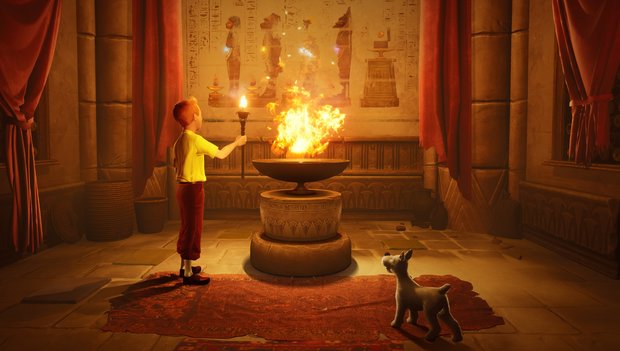
- 0 Comments
Potential for comic book adaptation goes up in smoke with buggy, superficial gameplay
Note: Since time of writing, a patch has been released that addresses many of the more significant technical issues referenced here. We can confirm it makes the game more stable, though some graphical issues and the fundamental gameplay remain unchanged. This article does not reflect any improvements made since its date of publication.
Popular culture has its own way of intertwining all kinds of genres; we see beloved stories from the literary world re-imagined as movies, popular game franchises are made into films and series, and it is almost the norm to produce a videogame whenever a large franchise film is released. Tintin may not be as famous as The Lord of the Rings, Star Wars, or the Marvel Universe, but the classic mid-1900s comic books from Belgian author Hergé have been made into movies, TV series and games alike. The latest but far from greatest adaptation seeking to honour the legacy and preserve the cherished stories of the titular young man and his dog is the action-adventure game Tintin Reporter: Cigars of the Pharaoh.
There is a great challenge in making any game from a popular franchise such as Tintin, as it will inevitably attract fans who have high expectations, myself included. Increasing those expectations even more in this case is the fact that Cigars of the Pharaoh was developed by Pendulo Studios and published by Microids. Both are established names with impressive pedigrees in the gaming industry, so it wasn’t unreasonable to have great hopes for this title. Unfortunately, the final product is a massive disappointment for both series fans and newcomers alike, with gameplay that is all over the place and riddled with bugs even long after release.
Tintin Reporter: Cigars of the Pharaoh is directly based on the fourth volume in the comic book series, published in 1932 under the same name, just without the “Reporter” part (a move I’m guessing was made to separate this game and any potential sequels from older installations). If you’re not familiar with the series, Tintin is a young Belgian reporter who continuously stumbles into dangerous adventures, and always seeks to fight injustice and cruelty with morality and wit. He is both charming and scrappy, brave and intelligent, and he is accompanied by his clever little dog Snowy. With his classic catchphrases such as “crumbs,” “dash,” and “crikey,” Tintin’s wholesome character is perfectly portrayed here, and he comes off just as friendly and loveable in the game as he does in the comics.
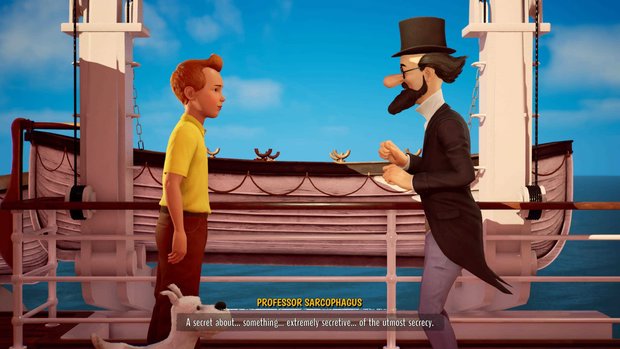
This adventure starts off on the cruise ship MS Epomeo, where Tintin and Snowy are on their way to Shanghai. Aboard the ship, Tintin meets the strange and scatterbrained professor Sophocles Sarcophagus, and after a small tussle with the law, Tintin and the professor venture on to discover an ancient Egyptian tomb. While entering the tomb, the professor disappears (something that will happen more than once during the game) and Tintin must not only seek him out but unveil a dangerous opium smuggling syndicate and a bigger, underlying political conspiracy. The story itself is wonderful, full of adventure and action as Tintin stories usually are, but it follows the comic book basically page by page, so if you have read it there won’t be any narrative surprises waiting for you.
We get to accompany Tintin on his travels to many different and exciting locations, such as the Egyptian desert, a smuggling boat with a questionable crew, the streets of Abudin in Arabia, and the Indian jungle, just to mention a few of the exotic places he visits. The settings are not only varied, but their realistic 3D depictions are beautiful to look at as well. The MS Epomeo is lavishly decorated with lots of details, and the Egyptian tomb is truly a sight to behold with its ancient but remarkably well-preserved ornate adornments.
Although the game follows the comic book story, you don’t play out all the scenes from the comic directly. Some passages are quickly narrated by Tintin as you get to see some photos of what happens, and travel is signified by a map with flight paths on it, just as in the 90s TV show. The problem with this is that some sections are skipped past very quickly, and some parts are expanded way more than what they need to be. Sometimes there were so little context or explanation for Tintin suddenly appearing in a new place that it puzzled me as to why and how I had ended up where I was. Understandably, elaborating on every part of the comic book would make the game too long, but some story elements are lost when transitioning so abruptly, and I found switching between scenes and locations often felt confusing because of it.
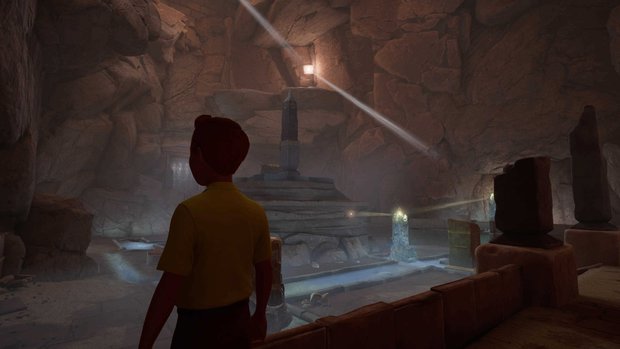
You play as both Tintin and his canine companion Snowy at times, switching between third person when you play as the former, and first dog when you play as the latter. Gameplay with Snowy mainly consists of sneaking and stealth, whether the adorable little Fox Terrier needs to save his master from sticky situations or help him get past an obstacle. The first-hand perspective when playing as Snowy is a fun change from when you play as Tintin, although it sometimes made me queasy, since the camera swings around pretty quickly and you often have to move fast to avoid getting caught.
Playing as Tintin is a whole other ordeal. In order to stop the opium smuggling syndicate, he will have to solve various puzzles, look for clues, perform action sequences with running and Quick Time Events, drive fast cars and even fly an aeroplane. It seems the only thing not included is shooting! The developers actually boast about having so many gameplay elements crammed into one game, but the result ends up feeling overwhelming and chaotic over the course of the game’s twelve-ish hours of play time.
I would say that the most common type of gameplay is the action sequences with running and QTEs. In these scenes, Tintin either needs to chase someone, or flee from someone, and by clicking the corresponding buttons, you either jump, vault, shimmy or roll under obstacles. The camera kind of guides you in the right direction too, something that is a nice touch, so that you don’t run the wrong way or get stuck somewhere. Most of the action sequences also have some kind of timing aspect, whether you need to drive to a place within a certain time limit, or if you let the person you’re chasing get too far away, you need to start over from the last checkpoint. Thankfully the checkpoints are pretty frequent, as there is no manual save function, and there is a chapter selection in the main menu, should you want to replay specific parts of the game later. The chapter select came in handy when I had to reload a couple of times because of bugs. More on that later.
Although I can appreciate the desire to make Cigars of the Pharaohs more of an action-adventure, rather than just a puzzle game, I wish there was more investigation and actual gameplay than mostly action sequences where you don’t do much other than press the correct button. My favourite part of the game was when Tintin explores the Egyptian tomb, which is by far the section with the most puzzles, but this part almost felt like a completely different game than the rest. Although they aren’t particularly challenging, the puzzles here are great fun, including sliding blocks into their correct position, a musical listening puzzle, pointing light beams in the right direction, and other observation and memory puzzles. At this point in the story I got my hopes up, thinking that the rest of the game would be as entertaining as this location, but sadly, this is the only part of Cigars of the Pharaohs where the focus is on puzzles.
Now, you might think, “Ah, this girl just doesn’t like action games!” but the truth is quite the opposite. Some of my favourite games have QTEs, action and even shooting aplenty, so that’s not an issue at all for me. The problem is when there are too many different gameplay elements crammed into one game. In Cigars of the Pharaohs, you have Quick Time Events, sneaking, puzzle solving, fetch quests, dialogue-driven mini games, vehicle sequences in air and on land AND exploration, making the experience feel a little all over the place and inconsistent, rarely letting you settle into one element or another long enough to get comfortable with it.
It seems like the developers have tried very hard to stay true to the original source material of the comic, working alongside Tintinimaginatio, which is the company in charge of making sure anyone working with the franchise respects Hergé’s works. I completely understand and respect that choice, but the execution of the game falls immensely short. At its best, the game is mildly entertaining, but for the most part it is superficial, uninspired and buggy.
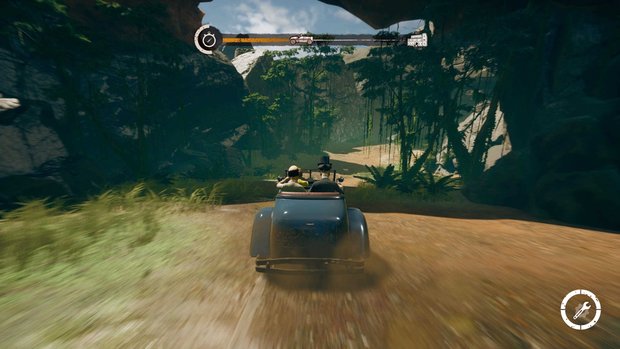
At several points I had to reload the game because of glitches. One time I had moved everything I needed into the correct place, but the interaction icon didn’t show up. Another time, in one of many stealth situations, the character I was supposed to sneak past was bugging out and walking backwards, catching me no matter when I tried to creep past him. I played the game both at launch and at a later point when these bugs were supposed to be fixed, but most of them were still there in my second playthrough. When the game was released, Pendulo did admit on social media that the game wasn’t what they wanted it to be, but that the issues would be taken care of later. However, this no longer appears to be the case, and now just seems like no one can be bothered to fix them anymore.
So Cigars of the Pharaohs doesn’t always control like it should mechanically, but it does sound and look nice – with a few more glitch exceptions. The soundtrack here is based on the music from the Tintin TV series from the 90s, not the Oscar-nominated score by John Williams made for the 2011 movie, but personally I love what I consider to be the classic Tintin theme. There are several other tracks that accompany your adventure, be it dramatic adventure overtures or snazzy sleuth-jazz. Sadly, the music is not exempt from bugs either, as several times I had to listen to two different tracks playing simultaneously.
Another thing that is pretty good is the voice acting. Apart from a couple of sailors on the MS Epomeo who sound more like surfer dudes than 1930s ship workers, the actors do a fine job of bringing to life the different parts while managing to avoid being offensively stereotypical, seeing as the Tintin series has sometimes been accused of being racist. The voice actor for Tintin in particular does a great job of depicting him as the perky, wholesome adventurer he is, without being over the top.
The character models are appealing too, keeping their whimsical characteristics in a 3D cartoony style. Tintin looks just like Tintin should, with his boyish appearance and characteristic quiff, and all the characters are equally delightful. From the long-nosed, bespectacled, bushy-bearded Professor Sophocles Sarcophagus to the nearly identical bowler-hatted annoying and incompetent detectives Thomson and Thompson, the whole cast has been designed very well.
It’s a shame, then, that the good-looking graphics are also riddled with bugs. At one point, Tintin flew his plane over the desert as whole squares of sand textures glitched out in huge untextured pieces. Sometimes objects are seen hovering in thin air as what they are standing on just disappears, and on one occasion a wall completely vanished when standing inside a room, so that I could see straight out to the garden outside.
Final Verdict
As a long-time fan of Tintin, I really wanted to love Cigars of the Pharaoh, but despite going in with enthusiasm and optimism, my joy was quickly turned into frustration and disappointment. I did temporarily get my hopes up again when the game began feeling more like an adventure, only for it to be turned around once more. This roller coaster of emotions eventually soured my experience entirely, and as I got closer to the end I just wanted it all to be over. Numerous bugs and glitches, frustrating gameplay and fragmented storytelling dragged the whole game down from what at times showed the potential to be a good time. I’m not sure someone who isn’t a fan of the series would care enough about the Tintin brand to overlook all the rough edges, and even as a devoted series fan it is a tough pill to swallow. My only hope is that Pendulo and Microids take the criticism to heart, focusing more on what they do best if there's to be a sequel hinted at in the end scene.
Hot take
There’s potential here for a good time, but Pendulo and Microids have failed rather miserably at giving Hergé’s beloved character the game he deserves. Riddled with bugs and shallow gameplay that is all over the place, Tintin Reporter: Cigars of the Pharaoh is a disappointing experience that even a diehard fan of the series will have trouble enjoying for long.
Pros
- Great story and characters that stay true to the comic
- Wonderful soundtrack and good voice acting
- Investigation and the few puzzles involved are fun
Cons
- Inconsistent editing makes for choppy storytelling
- Too many superficial gameplay elements crammed in
- A buggy mess, both graphically, musically and most crucially during gameplay
Aurora played her own copy of Tintin Reporter: Cigars of the Pharaoh on PlayStation 5.

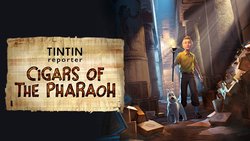

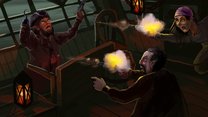






0 Comments
Want to join the discussion? Leave a comment as guest, sign in or register in our forums.
Leave a comment